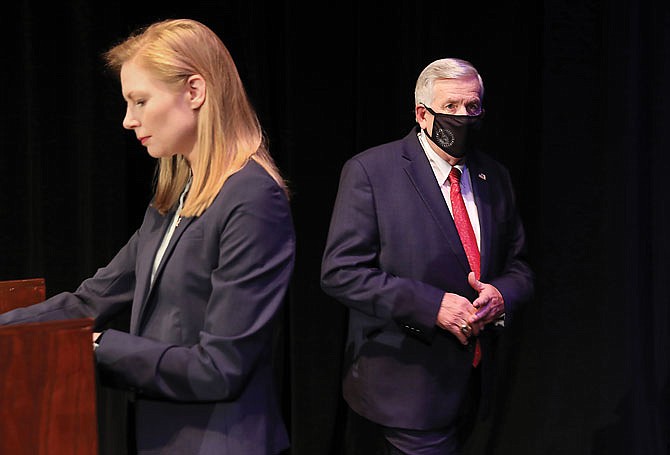The News Tribune reports on elections to equip community members with the tools they need to participate in democracy. That includes sharing candidates' positions on important issues and making information about the voting process accessible. For full coverage of local candidates in the November 2020 election, visit newstribune.com/election.
Voters will have many choices to make on Nov. 3 - if they have not already voted - and the state's gubernatorial candidates Friday shared their visions for addressing the crises at hand and the opportunities yet to come.
The four candidates for governor - incumbent Republican Gov. Mike Parson, Democratic State Auditor Nicole Galloway, Libertarian nominee Rik Combs and Green Party nominee Jerome Bauer - shared the stage Friday at the Missouri Theatre in Columbia.
The forum had been rescheduled after previously being postponed because of Parson's bout with coronavirus.
The ongoing COVID-19 pandemic was the subject or background to many of the questions candidates were given, but other topics included economic development, responses to crime, support for social justice, legislative redistricting, transportation and taxes.
The pandemic and its ramifications for health, the economy, education and other aspects of daily life will be the most immediate issues the next governor will face.
Parson focused on his administration's efforts, often - whatever the issue - coming back to having been on it at the earliest opportunity.
"We've taken a balanced approach from day one," Parson said of his administration's multi-front pandemic response - also touting the state's death rate has dramatically decreased and more testing is coming.
Galloway criticized Parson's response and said he talks about working every day, but what he's doing every day isn't working.
"We need a complete reset on our coronavirus strategy," Galloway said.
She said Missourians support a statewide mask mandate: "They see it as their ticket to freedom."
Combs advocated for a much more open, hands-off approach without any mandates, including from local authorities.
Parson and Bauer said they support local control.
Parson said people should have a say in the regulations that govern them.
Bauer added there also needs to be a science-based approach taken, and it's important to set a good example by wearing masks: "People have to want to obey the law."
The law is involved with some of the other big issues Missourians face and are advocating change on: fighting crime and addressing racial injustice.
On crime, Combs said more emphasis needs to be on fighting drugs and gangs.
He equated anti-fascist militant groups with the Black Lives Matter movement - viewing both as organizations - and said he could not support what he called their Marxist nature.
Parson said the state needs more police officers to fight crime, and though state lawmakers largely ignored much of his anti-crime agenda for this summer's special session, he said: "We didn't strike out, at all," and got legislation on witness protection that was the thing mayors chiefly called for.
In one of his more pointed attacks on Galloway, Parson said the decades-long "liberal agenda" he said she's part of caused crime problems.
Galloway took that to be an accusation of support for defunding police, which she said she does not support.
She added, "We should fund our police and fund support services," such as health care through Medicaid expansion and education to address deeply-rooted issues instead of relying on police for "quick resolution."
She in turn accused Parson of cutting the budget for law enforcement, specifically the Missouri Highway Patrol.
Parson said he didn't know what she was talking about.
The $448 million of restrictions to the state budget enacted this summer because of the financial challenges of the pandemic did include more than $1.8 million of withholdings from the Highway Patrol: more than $825,000 in fringe benefits, more than $739,000 for enforcement, $200,000 from the purchase of new vehicles, more than $43,000 for the Highway Patrol Academy, and $5,000 for the Water Patrol Division.
Parson later defended budget cuts, specifically in education: "Everybody in Missouri had to tighten their belts with what we were going through with the pandemic and the way things are in this state."
Speaking on social justice, Parson said "Black lives matter. All lives matter in this state," and he pointed to decisions this week by the state's law enforcement training authority as progress.
Those decisions included the addition of de-escalation and racial bias training into officers' continuing education requirements, though it will not be until 2022 when those additions take effect, following a formal rule-making process that includes a public comment period.
Parson denied an allegation from Galloway that his campaign has used "racially-divisive tactics," and he was later critical of her over an audit related to overtime for law enforcement in St. Louis.
Bauer's positions on crime and social justice included that gun violence should be addressed as a public health issue, communities of color should not be over-policed, and there should be some kind of reparations or restitution - "a serious attempt to redress the legacy of slavery and racism."

